Puerto Lopez in Manabi
is a fishy paradise. This dog-eared coastal town is home to the daily
fish market. It's a shopping experience that leaves first-timers
looking like the very fish being sold - that's wild-eyed and
open-mouthed.
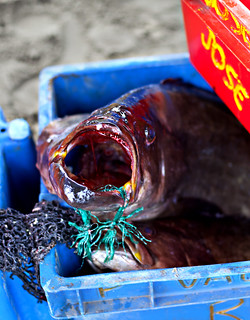 |
| My face at the fish market |
This is a world where
antediluvian sea-life (that wouldn't look out of place hung from the
ceiling of the Natural History Museum) sell straight from the boat
for a few dollars; where teams of gnarled, knife-wielding gutters
work tirelessly in the surf; and where you can barbecue the catch
you've just bought in the vast open-air beach kitchen – and all
this takes place without any respect for the encroaching tide.
From 5am each morning
the fishing boats begin to arrive onto Puerto Lopez beach. By 6am it
is already packed with a steady stream of fishermen bobbing offshore
waiting patiently for their turn to unload.
Once a boat beaches
itself – albeit ungainly and insecurely amid the buffeting waves -
a rapid-response team from the beach sprints out to meet it. Several
of the men make comic attempts to secure the boat with ropes while
the rest balance large buckets on their shoulders, ready to collect
the fish.
The fishing boats are
small and already look cramped – housing as they do about eight or
ten fishermen. What is magical is the vast quantities of fish they
contain, they must have hulls the depth of the Samaria Gorge to pack
this much cargo.
The fishermen go to sea
for two day stints, including a night in the ocean. Where do they
sleep? The local fishermen we asked gave us a bemused look, uncertain
the landlubbers weren't pulling his old sea leg: “On the boat of
course.”
The rapid responders
run to-and-fro through the surf like the most disappointing episode
of Baywatch. Each man is bearing back-breaking loads of fish and,
like Juggernaut, will trample to the foam all foolish enough to cross
his irresistible course.
The scene is chaotic
and the camera-clicking tourist should beware. It might all be taking
place on a public beach but this is an industrial setting; there are
fish hooks, lorries reversing, knives and buckets full of bloody guts
– and that's without mentioning the creepy sea birds that look like
pterodactyls (which I just spelled correctly at first attempt). In
England you'd need a hard hat and high-viz jacket before they let you
within fifty feet of this maelstrom.
Once the fish are
unloaded the real trading begins. About two thirds of the catch are
loaded straight onto lorries, vans or sorry-looking Chevrolet Sparks,
who are wondering what they did to anger the motoring Gods to deserve
this fate. This fish is destined for the packing plants, or bound for
the bellies of highland Quito – where the only local fish is a type
of anorexic trout. The fish is quickly boxed, packed in ice and
driven away in a death cloud of black diesel smoke.
Now it's our turn.
Except the canny local traders are already busy snapping up the best
fish. There's no point competing with these chaps, they can eye a
prize Corvina from 50 yards with a sharper eye than those terrifying
pterodactyl birds (no spell check, twice on the trot).
The sellers place their
fish on mats along the beach, inviting goggle-eyed tourists to
inspect their wares (apparently, goggle-eyed tourists are their
favourite customers). Clumsy Spanish, an English accent and not
having a clue what fish is what or what's it's worth left me a slight
disadvantage – but if I was getting ripped-off then it was the most
pleasant scam I've been the victim of. For example, I paid eight
dollars for a ten pound tuna (more about him later), five dollars for
eight King Prawns the size of my head, five dollars for two purple
fish of unknown vintage (an impulse buy), and the same again for a
juicy corvina (sea bass). I managed to resist the temptation to pay
two dollars for a squid who looked like he had only just given up a
lucrative career in swallowing fishing boats whole – Cthulhu in a
bucket.
I left the beach loaded
with Neptune's treasures. To put it plainly, if my oil drum barbie
was banking on a quiet night in front of the TV with a pizza and
Strictly Come Dancing then it had another thing coming.
Once you've bought your
fish you can take it to one of the gutting tables, there are about 30
operating furiously along the beach. It costs 50 cents per bag of
fish. The gutters work ankle deep in the surf and are oblivious to
the larger waves which sent me and the street dogs running for higher
ground. The dogs mooch around desultorily, trying to look
uninterested and innocuous; except they fail miserably and manage to
look very interested and deeply suspicious.
I was cradling my bag
of precious fish like Gollum, but most of the locals take their catch
straight to the smoking barbecues and spitting pans of the vast
open-air kitchen, operating just metres from the sea. The cooks will
serve you your fish, rice and plantain at a table in sight of the
same boat that landed the catch. The local men were more engrossed in
their tabloid newspapers, which are packed with more nudey girls than
even the Sport would consider tasteful.
My cradled bag of fish
would betray me with great embarrassment on the bus home. As I was
teetering gingerly towards the front, in preparation for the
military, rolling disembarking the drivers favour, a particularly
tight corner sent my bag swinging over the head of a family of four.
I hope it was only brine that leaked from withing, either way they
all received a fishy shower that morning. My shame was so great I got
off a stop early and walked.
Back to the ten pound
tuna. That evening I barbecued it and - with a only little help from
Lucy – managed to eat half a fish. That's five pounds of flesh we
consumed. Granted some of its total weight included head, brains,
bone and blood (most of which we'd dripped around the sparkling white
floor of SuperMaxi only realising at the checkout we'd just drawn a
grisly Hansel and Gretel route map of our shop – it was “Clean up
team to aisle four please... and aisle five, six, seven and ten.”)
With some rude maths, I
figured I'd probably eaten three pounds of tuna fish (not to mention
the four plantain and cheese bolons, a generous tomato quinua salad,
oh and the six bottles of Pilsner). Most people won't know this, but
three pounds of tuna does not a comfortable digestion aid. I felt a
bit like my old dog Jack after he broke into the fridge and ate two
packs of butter, an uncooked chicken, six cherry yoghurts and an
entire block of cheddar cheese – shrink-wrap and all. I could have
wept, and if I had it would been with tuna-tinged tears. As I write,
there are another five pounds of tuna wrapped in tin foil in the
fridge like some shameful crime.
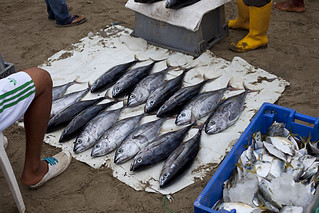 |
| Pick a tuna |
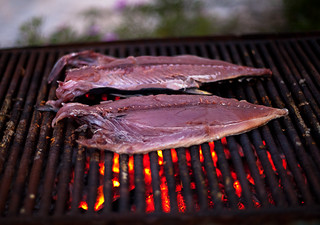 |
| Ten pounds of tuna feeling the heat |
Puerto Lopez fish
market is a refreshing example of just letting people get on with it.
Proof that if you allow thousands of people to converge in a heady
cocktail of trucks, guts, hooks, boats, ropes, dogs, knives,
barbecues and pteradactyls (bugger) almost nobody will die... and if
they do the tide will simply wash the bodies away, along with all the
fish guts.
UPDATE:
We've been going to the fish market a few times a week and there's always something new to see. However, when we went today it was clearly a special day. As we approached there was a strange atmosphere, a nervous excitement crackled in the air like static electricity. When we reached the fishing boats, which were beached further out than usual, it was obvious what was fueling the atmosphere.
We've been going to the fish market a few times a week and there's always something new to see. However, when we went today it was clearly a special day. As we approached there was a strange atmosphere, a nervous excitement crackled in the air like static electricity. When we reached the fishing boats, which were beached further out than usual, it was obvious what was fueling the atmosphere.
Every boat contained
about four or five enormous sharks. It was a shocking sight up close;
their great tail fins; their uncanny smiles; and their terrifying
jaws (even dead). The size of the fish was astonishing, perhaps
twelve feet long and two hundred pounds. The sharks were being
butchered on the beach and the blood ran like streams to the sea.
When they sliced open the stomachs, fish the size of the enormous
tuna I'd bought last week slithered out, barely digested. But all
eyes were on the shark meat.
It seemed a tragedy
that so many (perhaps 100) of these impressive creatures were dead on
the beach. Lucy got upset at the sight.
The sharks are known
locally as rabones. In English they're known as threshing sharks and
are most easily identified by their enormous tails. A local fisherman
told us how happy he was with the catch. “You could support a
family for a week with one of these fish?” Lucy asked.
“No,” he said. “For
a month.”
Each fish would sell at
market for between $300 - $400. Not a bad day's work when you're
unloading five fresh rabones from the ice. It's little wonder Puerto
Lopez beach was buzzing with so much nervous excitement. There was
going to be plenty of Cana Manabita drunk that day.
.jpg) |
| Thresher shark, otherwise known as rabones |

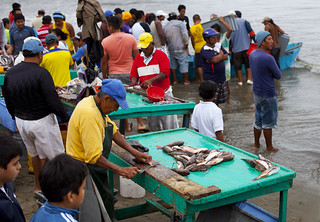
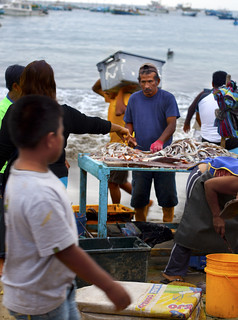
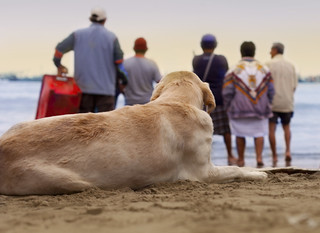
No comments:
Post a Comment